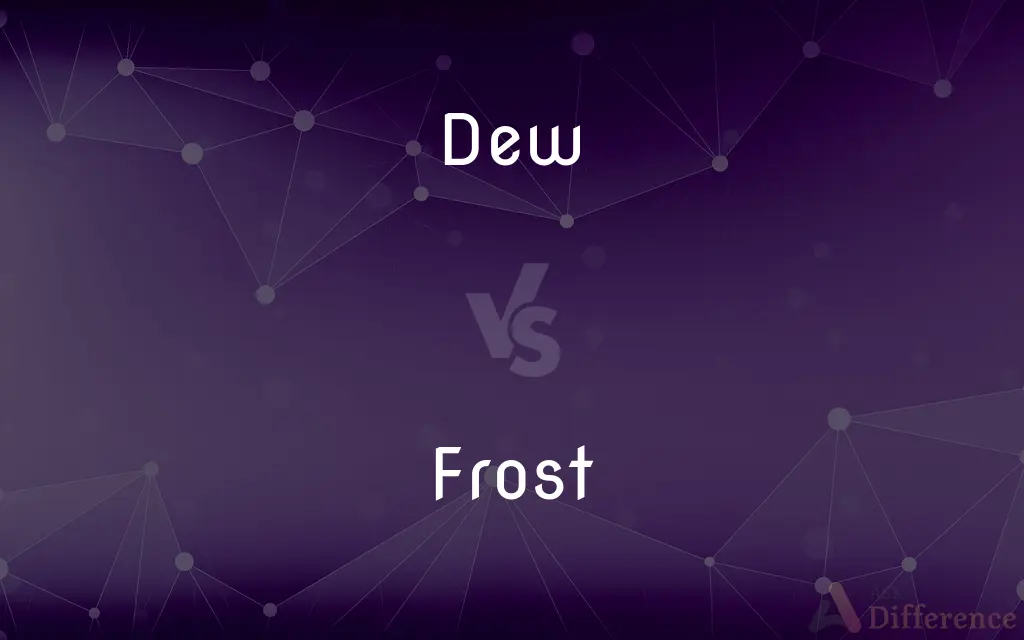Dew vs. Frost — What's the Difference?
By Urooj Arif & Maham Liaqat — Updated on March 27, 2024
Dew forms as water vapor condenses, while frost occurs when water vapor freezes, showcasing the delicate balance between temperature and humidity.

Difference Between Dew and Frost
Table of Contents
ADVERTISEMENT
Key Differences
Dew is the result of water vapor in the air condensing into liquid water on surfaces when the temperature drops to the dew point. It's a sign of moisture in the air and is often seen on grass, leaves, and cars in the morning. Frost, on the other hand, forms under similar conditions but when the surface temperature falls below freezing. It appears as tiny ice crystals, creating a white, crystalline layer on those same surfaces.
While dew can form whenever the conditions of temperature and humidity are right, typically in warmer conditions, frost requires not only high humidity but also temperatures below the freezing point. This difference underscores the roles of temperature and humidity in their formation processes.
The presence of dew is often welcomed by gardeners as it indicates adequate moisture levels in the air, beneficial for plant growth. Frost, while it can create picturesque scenes, often signals the onset of colder weather and can be damaging to sensitive plants.
Both dew and frost disappear as the sun rises and the temperature increases. However, the process for dew involves simple evaporation back into the air, whereas frost requires sublimation, transitioning directly from solid to gas without becoming liquid.
Comparison Chart
Formation
Condensation of water vapor into liquid
Freezing of water vapor into ice crystals
ADVERTISEMENT
Required Conditions
Cooler temperatures near the dew point without being freezing
Temperatures below freezing
Visual Appearance
Clear, wet droplets on surfaces
White, crystalline ice crystals on surfaces
Impact on Plants
Generally beneficial, indicating moisture
Can be harmful, causing freeze damage to sensitive plants
Disappearance
Evaporates with rising temperatures
Sublimates under the warmth of the sun
Compare with Definitions
Dew
Water droplets formed by condensation.
Dew covered the lawn, making it sparkle in the sunlight.
Frost
Frozen dew or vapor.
A thin layer of frost covered the pumpkin patch overnight.
Dew
A sign of atmospheric moisture.
The presence of dew in the morning indicates a humid night.
Frost
Ice crystals on surfaces.
Frost patterns on the leaves added beauty to the winter morning.
Dew
The result of air cooling to the dew point.
Dew forms when nighttime temperatures drop to the dew point near the ground.
Frost
Sublimation upon exposure to the sun.
The frost disappeared with the first rays of the sun, turning directly into vapor.
Dew
Condensed moisture.
Morning dew glistened on the spider's web.
Frost
A sign of freezing temperatures.
Frost on the window is a sure sign of winter's approach.
Dew
A natural source of water for plants.
Dew provides essential moisture to plants in arid environments.
Frost
Potentially damaging to plants.
The unexpected frost damaged the early blooms in the garden.
Dew
Dew is water in the form of droplets that appears on thin, exposed objects in the morning or evening due to condensation. As the exposed surface cools by radiating its heat, atmospheric moisture condenses at a rate greater than that at which it can evaporate, resulting in the formation of water droplets.When temperatures are low enough, dew takes the form of ice; this form is called frost.
Frost
Frost is a thin layer of ice on a solid surface, which forms from water vapor in an above-freezing atmosphere coming in contact with a solid surface whose temperature is below freezing, and resulting in a phase change from water vapor (a gas) to ice (a solid) as the water vapor reaches the freezing point. In temperate climates, it most commonly appears on surfaces near the ground as fragile white crystals; in cold climates, it occurs in a greater variety of forms.
Dew
Water droplets condensed from the air, usually at night, onto cool surfaces.
Frost
A deposit of small white ice crystals formed on the ground or other surfaces when the temperature falls below freezing
The lanes were glistening with frost
It is not unusual for buds to be nipped by frost
Dew
Something moist, fresh, pure, or renewing
"The timely dew of sleep / ... inclines / Our eye-lids" (John Milton).
Frost
Cover (something) with or as if with frost; freeze
Shop windows were still frosted over
Dew
Moisture, as in the form of tears or perspiration, that appears in small drops.
Frost
Decorate (a cake or biscuit) with icing
The cake Mama had just frosted
Dew
To wet with or as if with dew.
Frost
A deposit of minute ice crystals formed when water vapor condenses at a temperature below freezing.
Dew
(uncountable) Any moisture from the atmosphere condensed by cool bodies upon their surfaces.
Frost
A period of weather when such deposits form.
Dew
(uncountable) Moisture in the air that settles on plants, etc in the morning or evening, resulting in drops.
Frost
A cold manner or period of disaffection
A frost in diplomatic relations.
Dew
An instance of such moisture settling on plants, etc.
There was a heavy dew this morning.
Frost
To cover with frost.
Dew
(figurative) Anything that falls lightly and in a refreshing manner.
Frost
To damage or kill by frost.
Dew
(figurative) An emblem of morning, or fresh vigour.
Frost
To cover (glass, for example) with a roughened or speckled decorative surface.
Dew
To wet with, or as if with, dew; to moisten.
Frost
To cover or decorate with icing
Frost a cake.
Dew
Moisture from the atmosphere condensed by cool bodies upon their surfaces, particularly at night.
Her tears fell with the dews at even.
Frost
To bleach or lighten the color of (hair) with dye so that some but not all strands are changed in color.
Dew
Figuratively, anything which falls lightly and in a refreshing manner.
Frost
(Slang) To anger or upset
What really frosted me about the incident was the fact that you lied.
Dew
An emblem of morning, or fresh vigor.
Frost
To become covered with frost
The windshield frosted up overnight.
Dew
To wet with dew or as with dew; to bedew; to moisten; as with dew.
The grasses grewA little ranker since they dewed them so.
Frost
A cover of minute ice crystals on objects that are exposed to the air. Frost is formed by the same process as dew, except that the temperature of the frosted object is below freezing.
Dew
Same as Due, or Duty.
Frost
The cold weather that causes these ice crystals to form.
Dew
Water that has condensed on a cool surface overnight from water vapor in the air;
In the morning the grass was wet with dew
Frost
(figurative) Coldness or insensibility; severity or rigidity of character.
Frost
(obsolete) The act of freezing; the congelation of water or other liquid.
Frost
A shade of white, like that of frost.
Frost
A disappointment; a cheat.
Frost
(television) A kind of light diffuser.
Frost
(transitive) To cover with frost.
Frost
(intransitive) To become covered with frost.
Frost
(transitive) To coat (something, e.g. a cake) with icing to resemble frost.
Frost
To anger or annoy.
I think the boss's decision frosted him a bit.
Frost
(transitive) To sharpen (the points of a horse's shoe) to prevent it from slipping on ice.
Frost
(transitive) To bleach individual strands of hair while leaving adjacent strands untouched.
Frost
The act of freezing; - applied chiefly to the congelation of water; congelation of fluids.
Frost
The state or temperature of the air which occasions congelation, or the freezing of water; severe cold or freezing weather.
The third bay comes a frost, a killing frost.
Frost
Frozen dew; - called also hoarfrost or white frost.
He scattereth the hoarfrost like ashes.
Frost
Coldness or insensibility; severity or rigidity of character.
It was of those moments of intense feeling when the frost of the Scottish people melts like a snow wreath.
The brig and the ice round her are covered by a strange blackobscurity: it is the frost smoke of arctic winters.
Frost
To injure by frost; to freeze, as plants.
Frost
To cover with hoarfrost; to produce a surface resembling frost upon, as upon cake, metals, or glass; as, glass may be frosted by exposure to hydrofluoric acid.
While with a hoary light she frosts the ground.
Frost
To roughen or sharpen, as the nail heads or calks of horseshoes, so as to fit them for frosty weather.
Frost
Ice crystals forming a white deposit (especially on objects outside)
Frost
Weather cold enough to cause freezing
Frost
The formation of frost or ice on a surface
Frost
United States poet famous for his lyrical poems on country life in New England (1874-1963)
Frost
Decorate with frosting;
Frost a cake
Frost
Provide with a rough or speckled surface or appearance;
Frost the glass
She frosts her hair
Frost
Cover with frost;
Ice crystals frosted the glass
Frost
Damage by frost;
The icy precipitation frosted the flowers and athey turned brown
Common Curiosities
Can dew and frost form at any time of day?
Both typically form overnight when temperatures drop, but frost requires colder conditions below the freezing point.
What is dew?
Dew is water vapor that has condensed into liquid form on cool surfaces near the ground, typically seen in the morning.
Is there any way to protect plants from frost?
Covering plants overnight with fabric or using frost cloths can help protect them from freeze damage.
What is the dew point?
The dew point is the temperature at which air becomes saturated with moisture and dew begins to form.
What is frost?
Frost occurs when water vapor freezes into ice crystals on surfaces, often visible on cold mornings as a white, crystalline layer.
How do dew and frost differ in formation?
Dew forms through condensation when the temperature drops to the dew point, while frost forms when the temperature drops below freezing, causing water vapor to freeze.
How can frost be damaging to plants?
Frost can cause freeze damage to sensitive plants by forming ice within their tissues, disrupting water flow and causing cells to burst.
What factors influence the formation of dew and frost?
Temperature, humidity, and surface conditions are critical factors in the formation of both dew and frost.
Can frost form when the air temperature is above freezing?
Yes, frost can form even if air temperatures are slightly above freezing due to the cooling effect of clear skies on surface temperatures.
How does the presence of dew and frost affect driving conditions?
Dew can make surfaces slippery, while frost, especially on roads and windshields, can reduce visibility and traction, requiring caution.
How do dew and frost indicate weather patterns?
The presence of dew suggests moderate overnight temperatures and high humidity, while frost indicates a drop below freezing, often signaling clear skies and calm conditions.
Why is dew beneficial to plants?
Dew provides additional moisture to plants, especially in arid environments, helping to sustain them.
What role does wind play in the formation of dew and frost?
Wind can disrupt the formation of dew and frost by mixing air layers, but calm conditions favor their development.
Are there different types of frost?
Yes, there are several types of frost, including hoarfrost, which forms in clear, calm conditions, and black frost, which occurs when vegetation freezes without visible ice crystals forming.
Can dew be collected as a water source?
In some arid regions, dew collection systems are used to condense and collect water as a supplemental source.
Share Your Discovery

Previous Comparison
Elements vs. Component
Next Comparison
Submissive vs. RespectAuthor Spotlight
Written by
Urooj ArifUrooj is a skilled content writer at Ask Difference, known for her exceptional ability to simplify complex topics into engaging and informative content. With a passion for research and a flair for clear, concise writing, she consistently delivers articles that resonate with our diverse audience.
Co-written by
Maham Liaqat













































